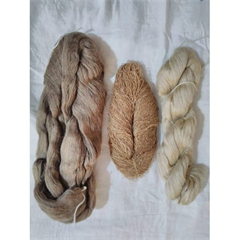Jute yarn is widely recognized as a sustainable fiber choice due to its environmentally friendly characteristics and its positive impact on both ecosystems and communities. Here are several reasons why jute yarn is considered a sustainable fiber:
- Renewable Resource: Jute is derived from the jute plant (Corchorus olitorius and Corchorus capsularis), which is an annual crop that can be harvested within 4-6 months. This makes it a rapidly renewable resource, unlike synthetic fibers that rely on petrochemicals.
- Low Water Usage: Jute requires relatively less water compared to other natural fibers like cotton. It is well-suited to regions with monsoon climates, where water resources may be limited for other crops.
- Minimal Chemical Inputs: Jute cultivation typically involves fewer pesticides and fertilizers compared to crops like cotton, reducing chemical runoff and contamination of soil and water.
- Biodegradability: Jute yarn is biodegradable, meaning it naturally decomposes over time without leaving behind harmful residues or microplastics. This makes it an environmentally friendly alternative to synthetic materials.
- Carbon Sequestration: Jute plants absorb significant amounts of carbon dioxide (CO2) during their growth, helping to mitigate greenhouse gas emissions and combat climate change.
- Erosion Control: Jute fiber and yarn are used in erosion control applications, such as jute geotextiles and mesh, which stabilize soil and prevent erosion in construction and landscaping projects.
- Support for Rural Communities: Jute cultivation and processing provide employment opportunities in rural areas, particularly in developing countries where economic opportunities can be limited. This contributes to poverty reduction and community development.
- Versatility: Jute yarn’s versatility allows it to replace less sustainable materials in various applications, reducing the overall environmental impact of industries like textiles, packaging, and construction.
- Sustainable Farming Practices: Jute cultivation often employs sustainable agricultural practices such as crop rotation and organic farming, which help maintain soil fertility and reduce the need for synthetic inputs.
- Reduced Energy Consumption: Jute’s natural color and texture often eliminate the need for energy-intensive dyeing processes, reducing energy consumption in the textile industry.
- Eco-Friendly Products: Jute yarn is used to create a wide range of eco-friendly products, including reusable shopping bags, clothing, and home decor items, providing consumers with sustainable choices.
- Reduction of Plastic Use: Jute yarn is used as an eco-friendly alternative to synthetic materials like plastic for packaging, helping reduce the consumption of non-biodegradable plastics.
Overall, jute yarn is considered a sustainable fiber choice because it combines renewable and eco-friendly qualities, supports rural livelihoods, and offers versatile applications across multiple industries. Its use contributes to a more sustainable and environmentally conscious approach to manufacturing and consumption.






















